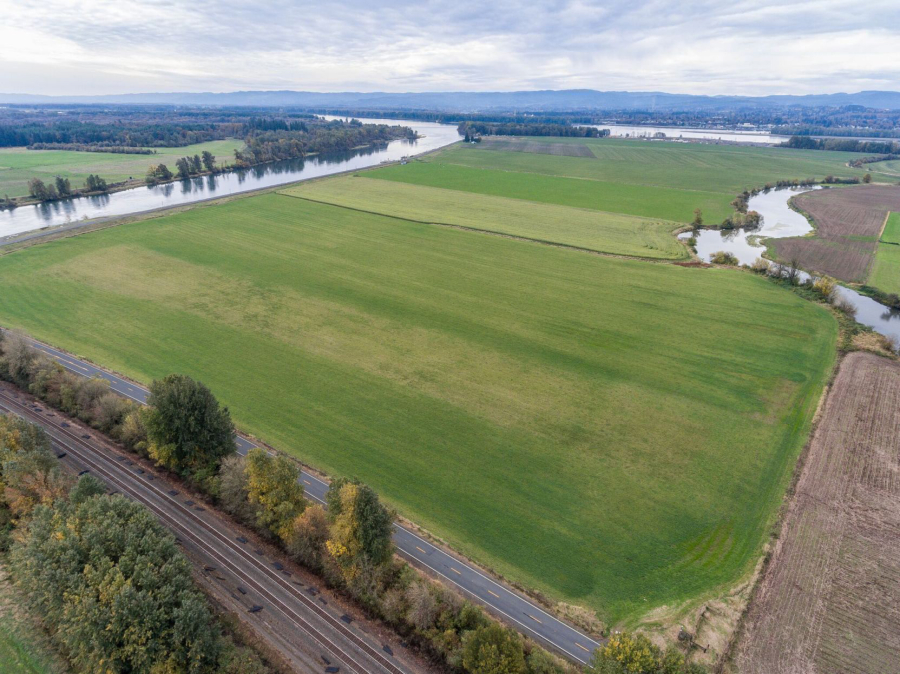LONGVIEW — Port of Woodland’s plans to develop Austin Point into a multimillion-dollar, deep-water access terminal took a big step forward last week when a state board approved a $1.7 million land sale needed for the project.
The Board of Natural Resources on Tuesday greenlighted the sale of 153.3 acres of agricultural land to the Port of Woodland after two years of negotiations.
The land will be used to build a rail line from the port’s existing property at Austin Point to the main BNSF Railway line, making the property the port’s first deep-water access site with rail access. That would enable the port to attract a large-scale industrial client that could generate millions of dollars in revenue and dozens of new jobs for the small Southwest Washington port.
“We’re looking forward to stepping up to the plate in the next step of growth for the port. This really does open up some opportunities for us,” said Jennifer Keene, executive director of Port of Woodland.
The port has long wanted to develop Austin Point into a bulk commodity terminal on the Columbia River, but a proposal for a grain terminal fizzled out in the 1980s under the weight of legal challenges. Development planning hit a roadblock again two years ago when the port realized that a land easement it needed for the rail access to Austin Point had expired in the late 1980s.
The port first sought to renew the easement for just 40 acres needed for the rail access, but the Department of Natural Resources said the port had to purchase all 153.3 acres connected to what it calls the Kuhnis Road Property, Keene said.
At one point in November, the deal had appeared to be dead when the outgoing head of DNR, former lands commissioner Peter Goldmark, axed negotiations for unclear reasons. Yet the port, with the help of state Rep. Richard DeBolt, R-Centralia, and other state legislators, was able to revive talks and renegotiate a deal with the new lands commissioner, Hilary Franz, Keene said.
After the board’s approval Tuesday, the sale of the Kuhnis Road Property is now pending and the port expects to have ownership by the end of the year, barring any significant legal challenges, Keene said.
In July, the Port of Woodland commission passed a resolution banning fossil fuel projects from Austin Point, clarifying the port’s existing comprehensive plan for the property. The resolution bars coal; petroleum products; liquefied natural gas; propane; dangerous waste; municipal waste; and toxic, reactive or hazardous substances from Austin Point.
Commodities that will be allowed include grains and other agricultural products; liquid edibles (cooking oil, vegetable oil, dairy products, fruit juices); rocks and aggregates; timber, lumber and wood products; cement, volcanic ash and potash; or steel and metal products.
The resolution helped the port earn the support of the Cowlitz Tribe, which had originally opposed the deal, Keene said.
Yet the anti-fossil fuels resolution wasn’t enough to squash opposition from Columbia Riverkeeper. The Hood River, Ore.-based group lobbied DNR to conduct a full environmental review of the Austin Point development, rather than just issuing a determination of non-significance on the Kuhnis Road Property purchase by itself.
“The fact that the (Austin Point) project isn’t being looked at cumulatively, it’s being looked at in a parcel-by-parcel manner, really denies the public an opportunity to understand and get involved in the process,” said Jasmine Zimmer-Stucky, a Riverkeeper organizer.
Zimmer-Stucky also cautioned that the port’s resolution could be undone if leadership on the commission changes, or if the commission gets desperate to pay back its large investment.
“By the time the port gets around to meeting with a tenant and having open houses, the port will have invested millions of dollars into this project. Because they bought the land and will be expecting a return on investment, if that comes in the form of fossil fuels, that’s puts them in a hard place,” Zimmer-Stucky said.
Zimmer-Stucky said Columbia Riverkeeper is reviewing its legal options to see whether it will challenge the Board of Natural Resource’s approval of the land purchase.
However, Keene said it would be difficult for the port commission to go back on its fossil fuel stance because it would be required to rescind its resolution and modify the port’s comprehensive plan, which would have to go through a public hearings process. Keene said the commission’s resolution also sends a signal to prospective clients that it isn’t interested in having a fossil fuel terminal there.
Billy Roberts, president of ILWU Local 21, said the union will hold off on supporting or opposing Austin Point developments until it knows whether a future prospective client is committed to using union labor. (Keene said the port commission does want to use union longshoremen on Austin Point.)
The port will issue bonds to pay for the land purchase. It also will raise some money by selling off some of the 153.3 acres it doesn’t need for the rail line.
Although some opponents feared the agricultural land could be rezoned for industrial use, Keene said the agricultural zoning will remain intact for all of the 153.3 acres.



